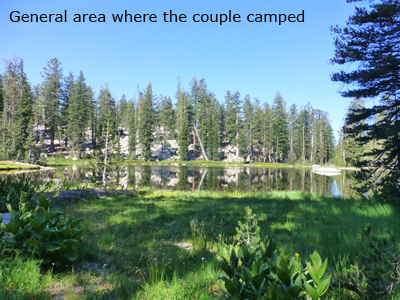On Sunday, July 27, the wife of a 37-year-old male hiker called the Yosemite Emergency Communications Center, reporting that her husband was having difficulty breathing. The couple had arrived in Tuolumne Meadows (elevation 8,600 feet) on Wednesday, July 23. On Saturday, July 26, in spite of feeling slightly ill, the subject, along with his wife, set out on a one-night backpacking trip. They were hiking slowly throughout the day. The subject’s condition deteriorated as he began experiencing difficulty breathing. That evening, the couple set up camp near a pond on the way to Clouds Rest. The subject continued to feel extremely ill, was coughing up sputum, and had difficulty sleeping. On Sunday morning, they tried to hike out. However, the subject, feeling even worse, couldn’t manage to carry his backpack. It was at this point that his wife called for help. The Tuolumne Meadows Search and Rescue team responded, assessed the patient, and determined that he needed a hasty evacuation. He was administered oxygen because he was having severe difficulty breathing and field diagnostic equipment indicated that the oxygen saturation levels in his blood were abnormally low. The SAR team arranged for the patient to be extricated via horseback. He remained on oxygen throughout the rescue. The patient was then transported out of the park to the hospital in Bishop. He was diagnosed with pneumonia and possible high altitude pulmonary edema. He remained in the hospital for two nights.
What lessons does this event offer?
First, if you notice you are not feeling well before your trip, consider changing your itinerary before you even set out on the trail; for example; instead of going on a planned overnight backpacking trip, try a shorter day hike. Keep in mind, also, that if, while you’re hiking, you take a turn for the worse, stop, rest, and if your condition doesn’t noticeably improve, turn around sooner rather than later.
Also, be mindful of the signs and symptoms of altitude sickness, also known as acute mountain sickness. This condition does affect some of our park visitors, especially those exploring the higher altitude areas of the park. Headache, nausea, and general fatigue are common symptoms. Acclimatizing slowly is the best way to prevent this illness from progressing. Perhaps spend a night or two at elevation in the campground before you begin your overnight journey.

